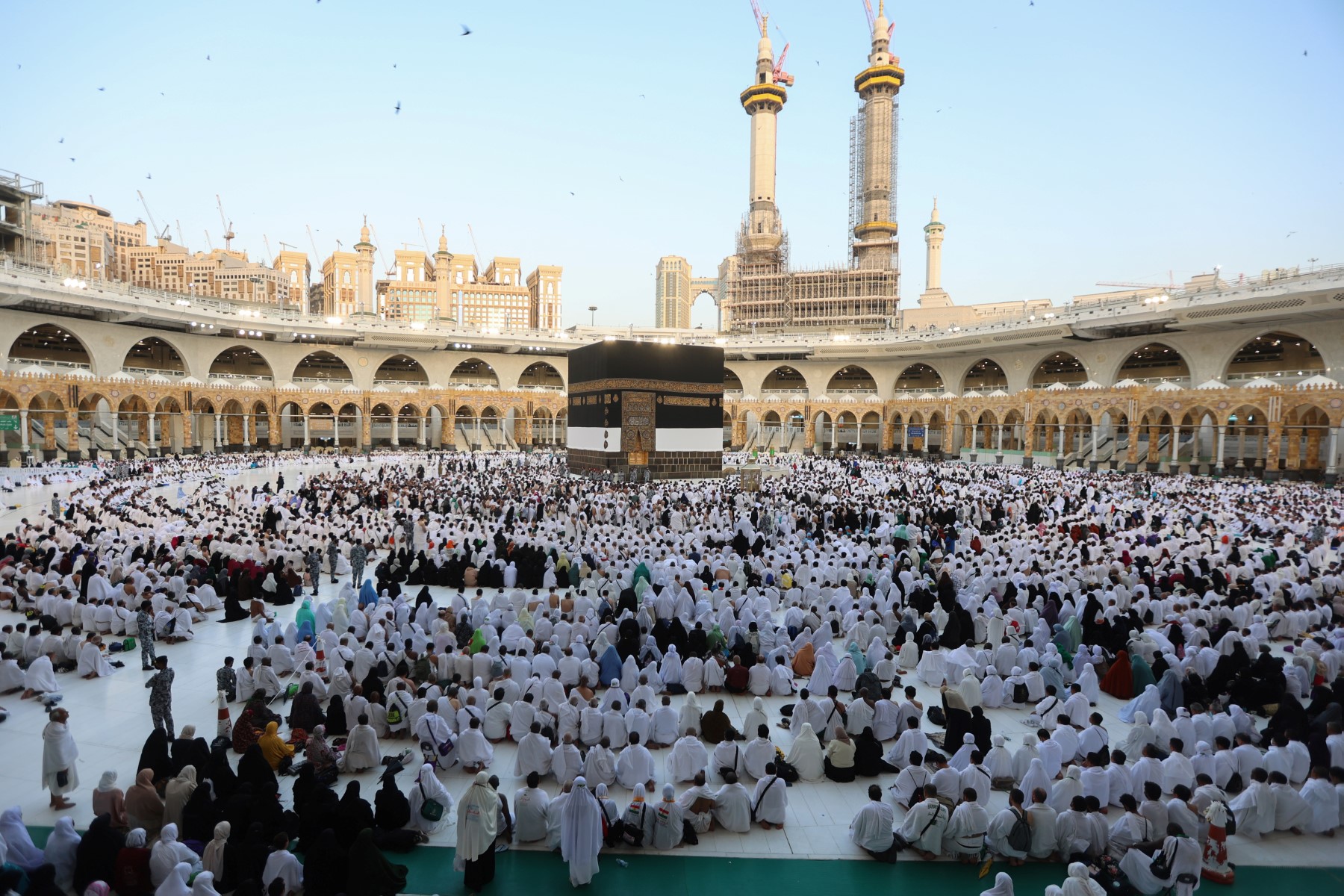Easing Nigeria’s hajj journey: A compassion call
Our great nation, Nigeria, a diverse religious landscape, the annual Hajj pilgrimage stands as a beacon of faith for the Muslim Ummah (community). It is a journey that transcends the physical, offering profound spiritual renewal and fulfillment. However, for many Nigerian Muslims, this sacred aspiration is becoming increasingly elusive, marred by financial constraints that threaten […]

FILE PHOTO: Muslim pilgrims gather around the Kaaba, Islam’s holiest shrine, as they perform Eid Al-Adha morning prayers in Mecca, on June 28, 2023. (Photo by Abdulghani BASHEER / AFP)
Our great nation, Nigeria, a diverse religious landscape, the annual Hajj pilgrimage stands as a beacon of faith for the Muslim Ummah (community). It is a journey that transcends the physical, offering profound spiritual renewal and fulfillment. However, for many Nigerian Muslims, this sacred aspiration is becoming increasingly elusive, marred by financial constraints that threaten to keep this spiritual pillar out of reach.
The Holy Quran explicitly commands the performance of Hajj for those who are physically and financially able to undertake the journey: “And [due] to Allah from the people is a pilgrimage to the House – for whoever is able to find thereto a way” (Quran 3:97). This verse underscores the importance of the pilgrimage in Islam, making it a duty for those who meet the specified conditions.
The recent developments involving the Hajj Commission of Nigeria (NAHCON) and the additional financial demands placed on intending pilgrims have sparked significant concern, necessitating the compassionate intervention of President Bola Tinubu and Vice President Kashim Shettima.
The initial directive from NAHCON, requiring intending pilgrims to deposit a specified amount into their Hajj savings accounts, was met with widespread compliance. These deposits represent not merely financial transactions but the culmination of years of sacrifice, hope, and dreams. The subsequent request for additional funds, however, has placed an undue burden on many, particularly those for whom the pilgrimage represents a lifetime of savings. The stark reality is that for the economically disadvantaged, the additional financial requirement is not just a hurdle; it is a barrier that could potentially prevent them from fulfilling a fundamental tenet of their faith in 2024.
- Hajj fare: Ndume seeks subsidy for first-timers
- Kano subsidises Hajj fare with N1.4bn for 2,096 intending pilgrims
The Hajj pilgrimage, as one of the five pillars of Islam, holds immense spiritual significance. It is a duty that every Muslim, who is physically and financially able, aspires to perform at least once in their lifetime. The journey to Mecca is not just a religious obligation but a profound expression of faith, offering a unique opportunity for spiritual rebirth and redemption. The current financial challenges faced by intending Nigerian pilgrims, therefore, represent not just an economic issue but a profound spiritual crisis.
The plight of these faithful aspirants calls for more than administrative adjustments; it demands compassionate leadership. President Tinubu and Vice President Shettima, as leaders of a nation rich in faith and diversity, are in a unique position to extend a hand of support to those who have dedicated years of their lives saving for this sacred journey.
The introduction of a special exchange rate or financial assistance for intending pilgrims for this year (and of course beyond) could serve as a lifeline, ensuring that the spiritual aspirations of Nigeria’s Muslim community are not thwarted by economic circumstances.
Islamic tradition places significant emphasis on the role of leaders, both spiritual and temporal, in facilitating the pilgrimage for their community members. This includes providing financial assistance to those who cannot afford the journey, ensuring the safety and security of pilgrims, and offering guidance and education on the rites and spiritual aspects of Hajj.
Many Islamic leaders and governments take active steps to support their citizens in performing Hajj, recognising the pilgrimage’s importance in fostering spiritual well-being and social cohesion. This includes organising and subsidising Hajj missions, providing healthcare and logistical support to pilgrims, and negotiating with the Saudi Arabian government to secure Hajj quotas for their citizens.
Moreover, this situation presents an opportunity for the Nigerian government to reaffirm its commitment to religious inclusivity and support. By addressing the financial barriers to the Hajj pilgrimage, the government can demonstrate its dedication to the welfare and spiritual well-being of all its citizens, irrespective of their economic status. Such an act of compassion would not only alleviate the immediate financial strain on intending pilgrims but also reinforce the bonds of trust and unity between the government and the Muslim community.
Furthermore, the challenges faced by intending Nigerian pilgrims to Mecca underscore the broader issue of economic disparity and its impact on religious practice. It highlights the need for a more inclusive approach to religious obligations, one that recognises the diverse economic realities of the faithful. Addressing this issue requires a collaborative effort, involving not only the federal government but also the states and local governments to ensure that the spiritual journey of Hajj is accessible to all who dream of it and made the required payment.
The financial hurdles faced by Nigerian Muslims intending to perform the Hajj pilgrimage call for immediate and compassionate intervention from President Bola Tinubu and Vice President Kashim Shettima as well as the state governors. By facilitating access to this pillar of Islam, they have the opportunity to uphold the principles of faith, inclusivity, and compassion that are central to Nigeria’s identity. It is a chance to ensure that the spiritual journey to Mecca remains a beacon of hope and renewal for all Nigerian Muslims, unmarred by economic or exchange rate constraints. Let this be our nation’s commitment to supporting the spiritual aspirations of its people, reinforcing the foundational values of faith, unity, and compassion that bind the Nigerian community together.
Adam, Ph.D., wrote from Abuja
